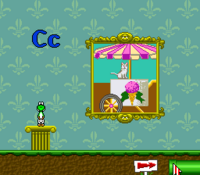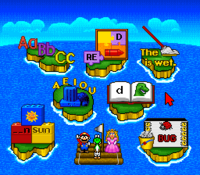Mario's Early Years! Fun with Letters: Difference between revisions
(→Trivia) |
UltraMario (talk | contribs) |
||
| Line 40: | Line 40: | ||
==Trivia== | ==Trivia== | ||
*One of the recurring selectable options in the game is [[Iggy Koopa]]. For unknown reasons however, the narrator refers to him as "Iggy Iggy". | *One of the recurring selectable options in the game is [[Iggy Koopa]]. For unknown reasons however, the narrator refers to him as "Iggy Iggy". | ||
<br clear=all> | <br clear=all> | ||
{{SNES}} | {{SNES}} | ||
Revision as of 20:38, April 16, 2011
Mario's Early Years! Fun with Letters is one of several educational games of the Mario series. Developed by The Software Toolworks and published by Nintendo, this game was released for the Super Nintendo Entertainment System in October 1994. It was produced as a successor to Mario's Early Years! Fun with Numbers, and is a predecessor of Mario's Early Years! Preschool Fun. The concept of all three games is largely identical, they only differ in which tasks the player has to fulfill.
Gameplay
Mario's Early Years! Fun with Letters is a Mario-themed educational game and is intended to teach the basics of the English language to young children. The game gives the player the option to play either as Mario, Yoshi, or Princess Toadstool. Which character is chosen does not affect gameplay at all, and is purely a matter of personal taste. The player controls the character indirectly by moving a cursor over the screen. By clicking somewhere on the screen, the player can make the character move to that spot. Clicking on an object will make the character interact with the object.
The game begins on a selection screen, from which every world is accessible. The screen shows a view of the ocean and an archipelago of seven. islands with various objects on top, representing the seven worlds of the game. On the bottom screen there is a raft carrying the three playable characters. The player can switch between characters here.
Each world in the game presents a specific task to the player. These tasks range from filling in words to complete sentences, finding words that contain a specific sound, or aligning three objects that start with the same letter. The player usually has to pick the correct solution out of three or four options in order to complete the task. Each world features different rooms accessible through pipes, presenting slightly varying options and tasks to the player. Each task can be played in two different ways. They can either experiment freely with the given options, or they can wake up the sleeping Luigi in each room by clicking on it, who will then watch the players actions. If Luigi is awake, he will compliment every right decision the player makes, and sometimes other characters will show up. Giving a certain amount of right answers makes the player advance to the next room, and eventually clear the world. However, since the game keeps no record of completed tasks, this does not serve any purpose.
Worlds
- First Letter World
- Vowel World
- Alphabet World
- Sentence World
- Building World
- Sound World
- Last Letter World
Audio
Other than most Mario games, Mario's Early Years! Fun with Letters features voice acting for all of its dialogue. The narration is done by a child's voice, with prerecorded words pasted together to form sentences. Luigi also speaks a few lines during the game's tasks. His dialogue is not pasted together, though. The soundtrack of the game features original and remixed versions of Super Mario World's music, and also some common nursery rhymes like Twinkle Twinkle Little Star and Itsy Bitsy Spider. The sound effects of the game have been taken from Super Mario World as well.
Trivia
- One of the recurring selectable options in the game is Iggy Koopa. For unknown reasons however, the narrator refers to him as "Iggy Iggy".

